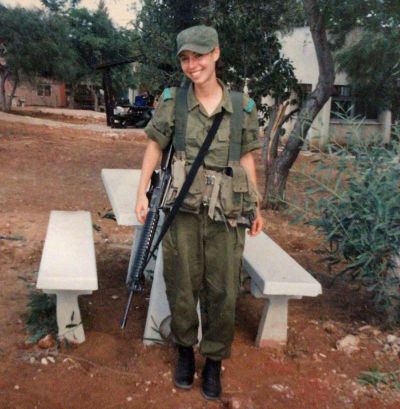Jewish American Girl Left Home at 18 to Join Israeli Army

At her high school graduation in Highland Park, New Jersey, school administrators acknowledged the impressive list of colleges many of her fellow students had been granted admission to attend in the fall.
Then they got to Keren Claster and announced she would be going into the Israeli Defense Forces (IDF).
"I didn't know anyone else doing that," she admits.
Like many sitting in the crowd of people assembled for the graduation, Keren's parents had been surprised to learn of her intentions. "What?" they exclaimed.
"But this is everything you taught me," she replied. As the granddaughter of holocaust survivors who were among the first Zionist settlers in Israel, Keren grew up in a thoroughly Jewish household.
Her parents moved from Israel to New Jersey when Keren was four-years-old, seeking career opportunities. "My house was very Israeli, the food, culture, language. My parents still can't speak English that well. They held on to their Israeli identity even though they have been in the U.S. for 30 years," she notes.
Her parents were both born in Israel. "Both had a difficult childhood," she notes, "that whole generation did — growing up in households with people that fled or were survivors (of the holocaust). Some survivors lived life to the fullest and were happy. Others were bitter, could show no emotion, were very difficult and hard."
While her mother's family was secular, her father's family was very religious. Despite their difference they fell in love, but shared other commonalities. "Both my parents are very Zionistic. Survival is a big word that I relate to in my childhood."
Two weeks after her high school graduation Keren moved to Israel. "I always knew growing up that I would go and serve in the army," she says. "I felt that since there is a Jewish state and it is serving me as well, I have a responsibility like any other 18 year old in Israel to serve the state."
After a week in Israel she started basic training and immediately experienced culture shock. While she spoke Hebrew growing up in her family home, "it was far from being proficient for what I was demanded to do. I remember crying a lot in the beginning," she recalls.
After basic training she became a class commander, then decided to go into an officer's training program. She was the youngest in her class. In addition to the physical and emotional demands, she had to master military studies. "I would stay up all night studying the material," she says.
A few years into her service, the army decided to de-segregate men and women and Keren was among the first.
She became a platoon commander in officer's training, with four classes and four class commanders under her. Then she advanced to become a deputy company commander, with four platoons and 16 classes she oversaw.
It was a major challenge at every turn. "Everything in the army pushes you one step further past what you think is possible for yourself," she says.
I remember having moments to look at myself from the side and thought, I can't believe I'm in Israel training the next generation of officers...getting chills and appreciating the moment."
One of her major challenges as a company commander was dealing with male immigrants from the former Soviet Union after they entered basic training. "Most had been in the Red Army and came with that baggage," she notes. Most didn't know the language and had been there only a few months."
"You can't imagine the things I dealt with...some were life threatening at points."
One day a few Bedouin soldiers of the IDF had words with some of the former Soviets in the IDF. "It broke into this huge fight and I found myself standing between 150 soldiers from the former Soviet Union who were my soldiers and these three Bedouins. Everyone had guns. It was scary." To her credit, Keren was able to defuse the crisis by standing in the gap.





















